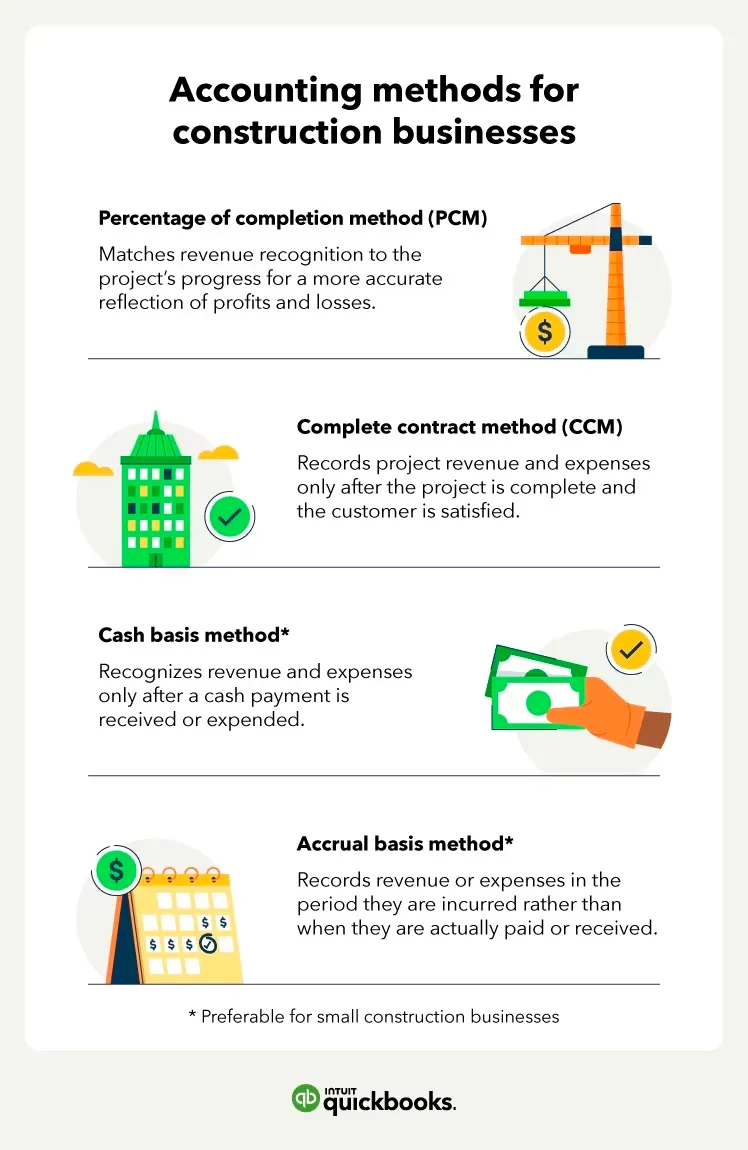Recognizing the Value of Building Accounting for Successful Project Monitoring

Function of Construction Bookkeeping
Building accounting serves as the foundation of economic administration in the construction industry, guaranteeing that tasks are completed within budget plan and economic purposes are satisfied. construction accounting. This specific bookkeeping technique addresses the one-of-a-kind challenges dealt with in building and construction jobs, including varying job periods, rising and fall costs, and numerous stakeholders
One of the primary roles of building bookkeeping is to offer exact price estimation and tracking throughout the job lifecycle. This facilitates informed decision-making, allowing job managers to readjust sources and timelines properly. Additionally, building bookkeeping improves capital management by keeping track of accounts payable and receivable, hence ensuring that funds are offered for timely repayments to subcontractors and suppliers.
In addition, construction audit aids in compliance with sector guidelines and reporting demands. It furnishes job managers with the necessary economic information to prepare in-depth financial declarations, which are necessary for audits and financial reviews. By preserving clear documents, building accountancy promotes transparency and accountability, vital components in developing depend on amongst stakeholders. Eventually, the duty of construction accounting prolongs past simple monetary monitoring; it is essential to strategic preparation and operational performance, driving the success of construction jobs in a competitive landscape.
Trick Components of Building Bookkeeping

Budgeting establishes a financial framework that guides project execution, enabling managers to allot resources effectively and prepare for possible financial obstacles. Precise cost tracking is necessary for monitoring costs in real-time, assisting to recognize variations between forecasted and real expenses. This allows timely adjustments to maintain the project on budget plan.
Furthermore, monetary reporting offers stakeholders with a clear image of the project's monetary wellness. Normal reports, such as revenue and loss statements and money circulation analyses, promote educated decision-making and boost transparency amongst all parties included.
Furthermore, compliance with industry guidelines and audit requirements is crucial. This ensures that monetary techniques are not only effective but also lawful, securing the company versus lawful repercussions. By incorporating these crucial components, building bookkeeping fosters an organized approach to taking care of funds, eventually contributing to the effective conclusion of construction tasks.
Advantages for Job Supervisors
Leveraging efficient construction bookkeeping practices offers task managers with a multitude of benefits that enhance both functional efficiency and economic oversight. One considerable advantage is enhanced budget administration. Exact tracking of incomes and expenses permits project managers to keep an eye on financial efficiency in real time, making sure jobs stay within spending plan and assisting in prompt modifications when required.
Additionally, construction accounting improves capital administration, making it possible for project managers to prepare for financial demands and enhance resource allowance. By recognizing money inflows and discharges, they can better take care of repayments to distributors, staff members, and subcontractors, thus avoiding costly delays.
Furthermore, robust accountancy systems supply extensive coverage capabilities. Job managers can create records that provide understandings into job productivity, expense variations, and resource use. This data-driven technique cultivates notified decision-making, allowing supervisors to recognize prospective concerns proactively and carry out rehabilitative measures.
Last but not least, adherence to building and construction accounting standards makes sure conformity with regulative and lawful requirements, decreasing the threat of penalties or disputes. On the whole, reliable building and construction accountancy gears up job supervisors with the devices required to drive project success, enhance stakeholder confidence, and promote long-lasting business growth.
Typical Difficulties in Building Accounting
Several task supervisors run into considerable challenges in construction accountancy that can hinder project success. One of the main difficulties is the complexity of tracking multiple task sites, each with distinctive budget plans, timelines, and source appropriations. This calls for precise attention to detail, which can be frustrating without a robust audit system in place.
In addition, varying product expenses and labor prices can complicate budget management, making precise forecasting difficult. Project supervisors usually battle to resolve these expenses with actual expenses, causing prospective financial disparities.
In addition, building and construction accounting entails conformity with different laws, consisting of tax obligation responsibilities and labor regulations. Navigating these guidelines can be complicated, especially for managers who might not have a strong accountancy history.
An additional considerable obstacle is handling capital, which is important in the building try this website sector. Hold-ups in invoicing, payments from customers, or unforeseen project changes can produce cash circulation shortages, endangering the job's development.
Lastly, reliable interaction between project supervisors, accounting Full Report professionals, and area groups is essential. Misunderstandings can cause incorrect monetary coverage, better making complex project administration initiatives. Addressing these obstacles proactively is vital for successful building and construction bookkeeping.

Best Practices for Effective Accountancy
While navigating the intricacies of construction audit can be overwhelming, embracing best techniques can substantially improve financial monitoring and job success. One essential technique is maintaining precise and timely documents. Executing durable accountancy software program customized to construction tasks can enhance data entry, invoicing, and reporting, conserving and decreasing mistakes time.
Additionally, developing a clear spending plan and regular tracking against this budget are vital. Using a system of routine economic evaluations allows task supervisors to identify variations early, facilitating timely decision-making. It is likewise necessary to different job costs right into indirect and straight groups, allowing clearer understandings into productivity.
An additional ideal technique entails promoting open communication amongst all stakeholders. Routine updates and joint conversations about monetary status can make sure everyone is aligned and notified. Educating team in construction-specific accountancy concepts even more boosts expertise and precision.
Lastly, ensuring conformity with appropriate accounting requirements and policies is non-negotiable. Normal audits and inner testimonials add to openness and liability, building trust fund with stakeholders and clients. By concentrating on these best practices, construction companies can maximize their accounting processes, inevitably driving job success and economic stability.
Conclusion
Finally, building audit plays a critical function in making sure successful job management by helping with precise economic oversight and improving decision-making. By incorporating vital elements such as price estimation, capital administration, and conformity, task supervisors can browse usual challenges and utilize finest practices for efficient audit. Inevitably, a durable building accounting structure not only safeguards budget honesty yet additionally adds to the general economic health and wellness of building and construction jobs, cultivating lasting success within the market.
By incorporating these vital components, construction accounting promotes an organized approach to handling financial resources, ultimately adding to the effective completion of building and construction jobs.
Precise tracking of earnings and costs allows job managers to keep track of financial performance in genuine time, making certain jobs stay within spending plan and promoting timely modifications when needed.
Job managers can create records that offer understandings right into job profitability, price variances, and source application.Numerous job managers come across significant difficulties in construction audit that can hinder job success. construction accounting. Eventually, a robust building and construction bookkeeping framework not only safeguards budget honesty but additionally like this contributes to the general economic health of construction jobs, cultivating lasting success within the market
Comments on “How Construction Accounting Can Help You Stay on Track with Your Budget”